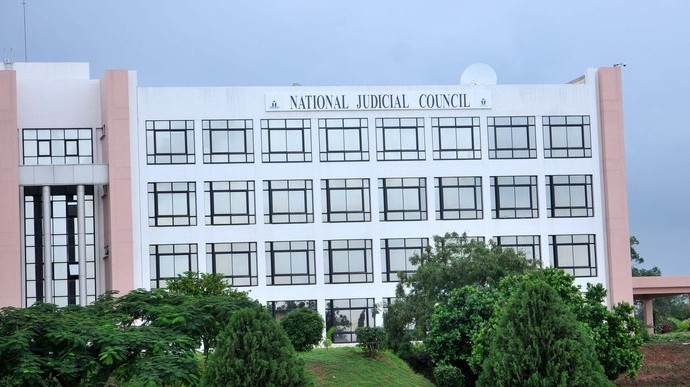Group blasts NJC over recall of suspended judges

Access to Justice, a judiciary advocacy group, has frowned at the decision of the National Judicial Council to recall some of the earlier suspended from judicial duties following allegations of corruption brought against them by the federal government.Joseph Otteh, the group’s Executive Director, said in a statement Sunday that the NJC’s en-bloc recall of the judges papers over the cracks of corruption in the judiciary.“One of the judges on its list is currently charged before the Code of Conduct Tribunal even though he has not been formally arraigned at this time,” Mr. Otteh said.“Some others are named in several other indictments against persons they are said to have acted in concert with.”Six of the suspended judges were recalled by the NJC, last Saturday, and would resume judicial duties on Wednesday this week.The judges include Adeniyi Ademola of the Federal High Court; John Inyang Okoro of the Supreme Court; Uwaji Aji of the Court of Appeal; Hydiazira Nganjiwa of the Federal High Court; Musa Kurya of the Federal High Court; and Agbadu James Fishim of the National Industrial Court.Mr. Ademola and seven other judges were suspended in November 2016 after a raid on their homes by the State Security Service.Three of the judges were charged to court, but only Mr. Ademola’s case has so far been concluded. The judge was acquitted of corruption charges.Mr. Otteh said some of the evidence elicited during the trial of some of the judges were “extremely perturbing.”
“While a court may not see fit at this time to conclude that the evidence tendered at trial yet reaches the thresholds to convict for a criminal offence, the evidence nonetheless creates deep impressions about the weaknesses of the Nigerian judiciary in the minds of reasonable observers of the trial and should not be swept under the carpet,” he said.“It is important to note that the NJC does not itself have powers to undertake criminal prosecutions but it has its own sphere of disciplinary responsibilities and authority over judges.“The Judiciary has a Code of Conduct for Judicial Officers: whether or not the provisions of that code have been broken is a legitimate and expedient inquiry that the NJC needs to pursue quite apart from whatever is the outcome of a criminal trial prosecuted by third parties.”In announcing the recall of the six judges, the NJC noted that there is a backlog of cases in their various courts for the past eight months.Mr. Otteh said the recall of the judges suffers from two major flaws, including the inability to make a plausible distinction regarding the respective situations of the various judges.“It treated different cases alike and literarily gave everyone, deserving or not, a free pass,” he said.“Second, given the inexorable necessity of restoring public confidence to the Judiciary, the NJC ought to have done more to demonstrate that we are not returning to the status quo ante, or returning to the state of ‘normal’ Nigerians had been used to in matters relating to judicial integrity.
“The NJC has a responsibility, quite apart from what third parties (such as prosecutors) do, to police the Judiciary and safeguard the integrity of the judicial institution. We do not think the NJC has sufficiently discharged that obligation to its fullest extent before recalling the judges.”Mr. Otteh, however, noted that the NJC’s decision could stand up to scrutiny in “a few instances” such as the failure of the federal government to formally charge some of the judges accused of corruption months after raiding their homes.
“It would be taken to mean that, in spite of all the grandstanding and boisterous noisiness in defence of its ‘sting’ operations, the government has nothing on them as the end of the day, notwithstanding that it had tarred everyone with the same brush,” he said.“For the future, government must reflect and learn from its misjudgments and forwardness, when it comes to investigating allegations of corruption against judges.“No judicial officer should have to go through the terror of being so publicly humiliated in the absence of strong and compelling justification.”problem




